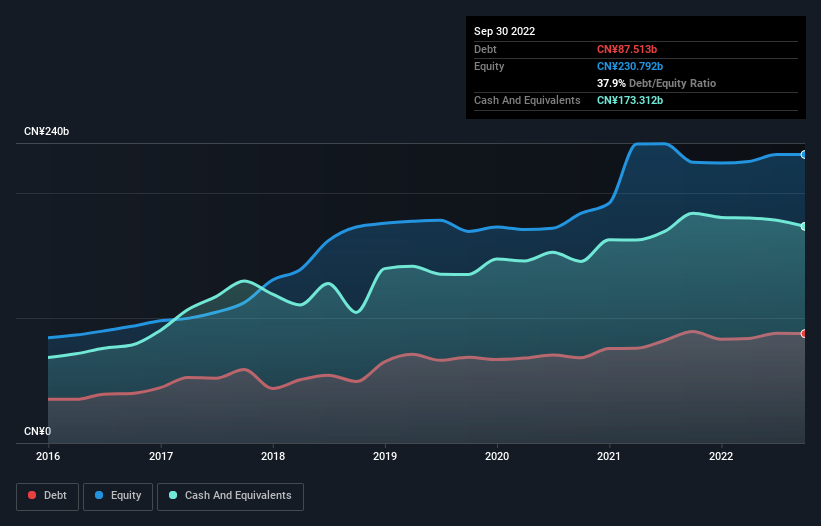- United States
- /
- Interactive Media and Services
- /
- NasdaqGS:BIDU
We Think Baidu (NASDAQ:BIDU) Can Stay On Top Of Its Debt

Some say volatility, rather than debt, is the best way to think about risk as an investor, but Warren Buffett famously said that 'Volatility is far from synonymous with risk.' So it seems the smart money knows that debt - which is usually involved in bankruptcies - is a very important factor, when you assess how risky a company is. We note that Baidu, Inc. (NASDAQ:BIDU) does have debt on its balance sheet. But should shareholders be worried about its use of debt?
What Risk Does Debt Bring?
Debt assists a business until the business has trouble paying it off, either with new capital or with free cash flow. If things get really bad, the lenders can take control of the business. However, a more frequent (but still costly) occurrence is where a company must issue shares at bargain-basement prices, permanently diluting shareholders, just to shore up its balance sheet. Of course, the upside of debt is that it often represents cheap capital, especially when it replaces dilution in a company with the ability to reinvest at high rates of return. When we think about a company's use of debt, we first look at cash and debt together.
View our latest analysis for Baidu
What Is Baidu's Net Debt?
The chart below, which you can click on for greater detail, shows that Baidu had CN¥87.5b in debt in September 2022; about the same as the year before. But on the other hand it also has CN¥173.3b in cash, leading to a CN¥85.8b net cash position.

A Look At Baidu's Liabilities
We can see from the most recent balance sheet that Baidu had liabilities of CN¥85.0b falling due within a year, and liabilities of CN¥73.3b due beyond that. Offsetting these obligations, it had cash of CN¥173.3b as well as receivables valued at CN¥14.6b due within 12 months. So it can boast CN¥29.6b more liquid assets than total liabilities.
This surplus suggests that Baidu has a conservative balance sheet, and could probably eliminate its debt without much difficulty. Succinctly put, Baidu boasts net cash, so it's fair to say it does not have a heavy debt load!
On the other hand, Baidu saw its EBIT drop by 8.5% in the last twelve months. That sort of decline, if sustained, will obviously make debt harder to handle. There's no doubt that we learn most about debt from the balance sheet. But ultimately the future profitability of the business will decide if Baidu can strengthen its balance sheet over time. So if you're focused on the future you can check out this free report showing analyst profit forecasts.
Finally, a business needs free cash flow to pay off debt; accounting profits just don't cut it. Baidu may have net cash on the balance sheet, but it is still interesting to look at how well the business converts its earnings before interest and tax (EBIT) to free cash flow, because that will influence both its need for, and its capacity to manage debt. Over the last three years, Baidu actually produced more free cash flow than EBIT. There's nothing better than incoming cash when it comes to staying in your lenders' good graces.
Summing Up
While it is always sensible to investigate a company's debt, in this case Baidu has CN¥85.8b in net cash and a decent-looking balance sheet. And it impressed us with free cash flow of CN¥12b, being 106% of its EBIT. So is Baidu's debt a risk? It doesn't seem so to us. When analysing debt levels, the balance sheet is the obvious place to start. But ultimately, every company can contain risks that exist outside of the balance sheet. We've identified 2 warning signs with Baidu , and understanding them should be part of your investment process.
At the end of the day, it's often better to focus on companies that are free from net debt. You can access our special list of such companies (all with a track record of profit growth). It's free.
Valuation is complex, but we're here to simplify it.
Discover if Baidu might be undervalued or overvalued with our detailed analysis, featuring fair value estimates, potential risks, dividends, insider trades, and its financial condition.
Access Free AnalysisHave feedback on this article? Concerned about the content? Get in touch with us directly. Alternatively, email editorial-team (at) simplywallst.com.
This article by Simply Wall St is general in nature. We provide commentary based on historical data and analyst forecasts only using an unbiased methodology and our articles are not intended to be financial advice. It does not constitute a recommendation to buy or sell any stock, and does not take account of your objectives, or your financial situation. We aim to bring you long-term focused analysis driven by fundamental data. Note that our analysis may not factor in the latest price-sensitive company announcements or qualitative material. Simply Wall St has no position in any stocks mentioned.
About NasdaqGS:BIDU
Baidu
Provides online marketing and non-marketing value added services through an internet platform in the People’s Republic of China.
Undervalued with solid track record.
Similar Companies
Market Insights
Community Narratives




